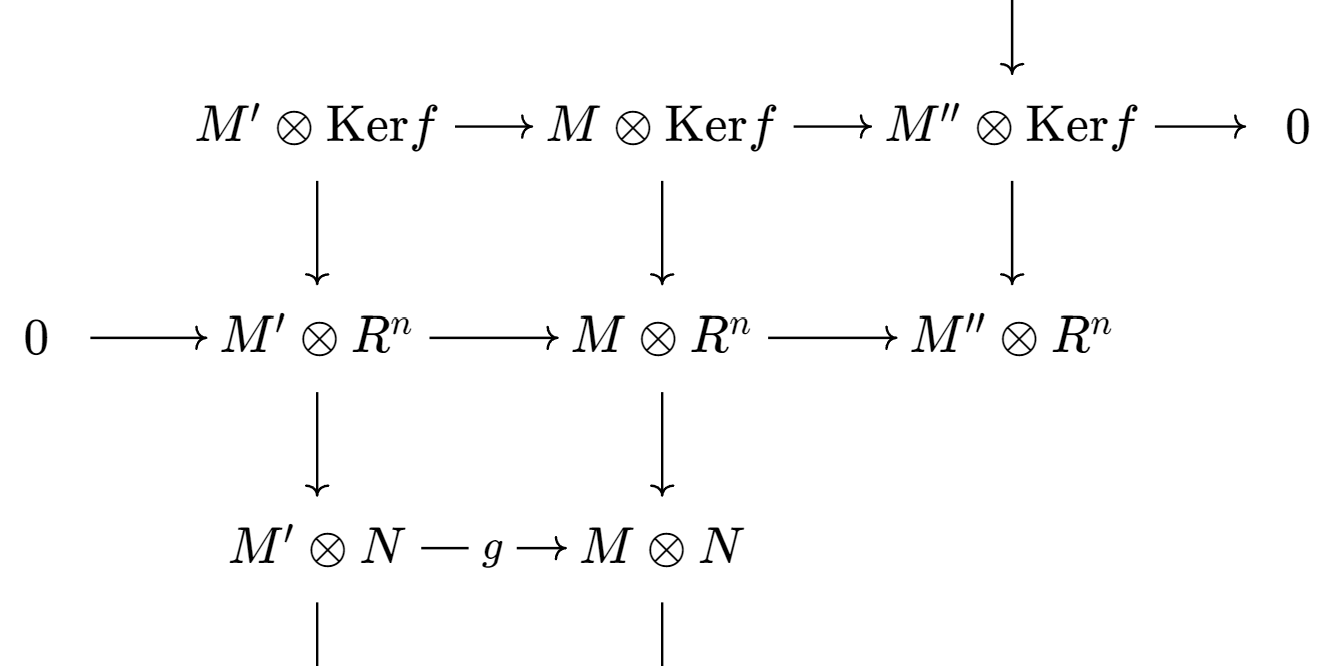这次是kunneth formula, 以及kunneth formula的直接推论, 同调万有系数定理和上同调万有系数定理. 没有学过代数拓扑所以基本上是从直观角度理解这个几个定理: 上同调万有系数定理应用比较直观, 直接给出了homology和cohomology之间的计算以及转换关系. 同调万有系数定理我觉得是在说这样一件事: 在改变定义同调时使用的系数环的情况下同调会发生什么样的变化. 这几个定理的证明说简单也简单, 也就是导出长正合列之后计算的事, 但是说复杂也很复杂, 这几个kernel都不是人算的. 这应该是一辈子只需要证明一次的定理, 使用比证明更加重要. P.S. kunneth formula 的证明可能有一点bug.(;′⌒`)
We talk about in this section.
Universal Coefficient Theorem
Lemma 1. For a exact sequence and an object , if flat, then
1. exact.
2. is flat if and only if is flat.
Proof
Proof. 1. We take a free presentation of and get the exact sequence . Then we tensor the exact sequence to it and obtain the following commutative diagram:
Each rows and columns are exact. By the snake lemma, is injective, thus exact.
- Take an injection and tensor , we have the following diagram
Its rows exact by 1. If flat, is injective thus injective, so flat. If flat, then is injective, from 5 lemma, is injective, thus is flat. ◻
Theorem 1 (Universal Coefficient Theorem). For object and a chain complex , if and flat for any , then we have the following sequence exact
Proof
Proof. Notice that we have the exact sequence
Tensor on it, from the lemma above, we have exact sequence
It induces a short exact sequence of chain complex
Use the long exact sequence theorem, since , , we have the long exact sequence
For the short exact sequence
we compute and . From the snake lemma, we have the morphism is , where is the connecting morphism in the long exact sequence derived by , i.e.
Since is right exact, the diagram is commutative with exact rows
We have .
On the other hand, we consider the short exact sequence
Using the long exact sequence theorem of
To compute , we consider the short exact sequence
Using the long exact sequence theorem of
Since , flat, . We have . Notice , we finally have
So . Finally
◻
Theorem 2. For a PID , the exact sequence
splits.
Proof
Proof. Notice that for PID , the exact sequence
splits. After tensoring , the exact sequence
splits. So is direct summands of , i.e. the direct summands of . Quotient , we have to be the direct summands of . ◻
Universal Coefficient Theorem for Cohomology
Theorem 3. For and object and a chain complex , if and projective for any , then we have the following sequence exact
Proof
Proof. Similar to universal coefficient theorem for homlogy. ◻
Theorem 4. For PID , the exact sequence
splits.
Proof
Proof. Similar to the proof for homology. ◻
Kunneth Formula
Lemma 2. For two chain complex , , if the differential
morphism of are the zero morphisms, then we have
Proof. Notice that and the differential morphisms of are , i.e. we only have the vertical morphisms. So
. ◻
Theorem 5 (Kunneth Furmula). For two chain complex , if , , are all flat for , then we have the sequence exact
Proof
Proof. Consider the exact sequence
Apply fuctor on it, we have
To form a double chain complex, we define and to be the zero morphisms. So we have the exact sequence of tensors
Use the long exact sequence theorem, we have the long exact sequence
From the lemma above
Via shifting the complex
So we have the long exact sequence
Consider the short exact sequence
We compute the short and . For the short exact sequence
we have the long exact sequence
From the universal coefficient theorem
so
Similarly,
◻
Theorem 6. For PID , the short exact sequence splits.
Proof
Proof. Omitted. ◻




